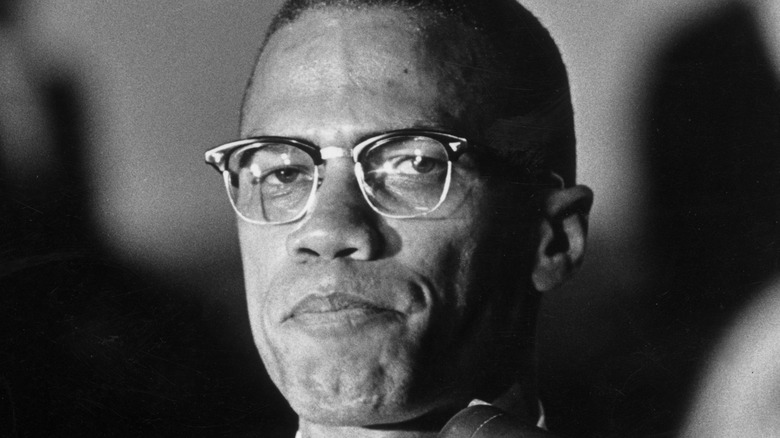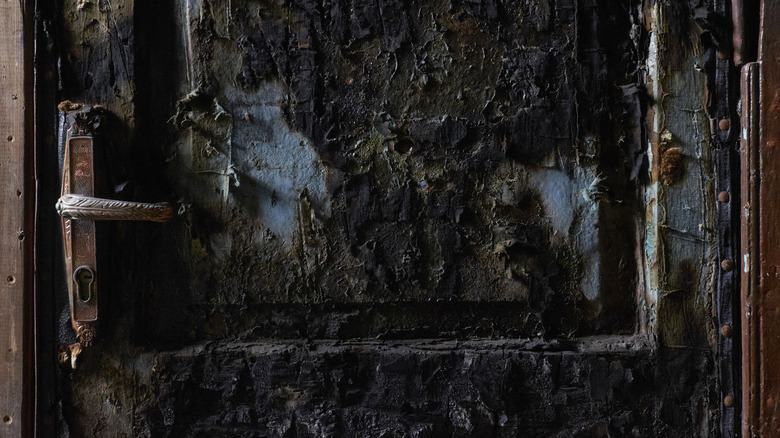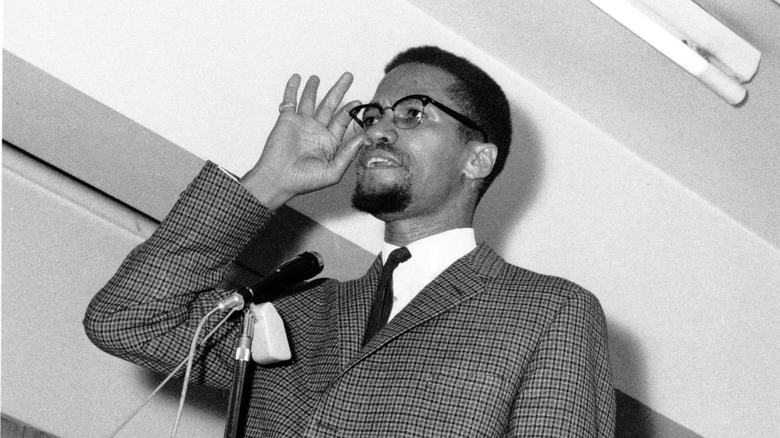Inside Malcolm X's Speech After His Home Was Bombed
Malcolm X knew he could die soon. It was 1965, and for the past two years animosity had been growing between Malcolm X and the Nation of Islam. He had previously been a leader in the Islamic, Black nationalist movement before leaving in 1963, disapproving of both the political strategies and sexual activities of Nation of Islam head Elijah Muhammad (via Britannica). The latter disliked Malcolm X's national influence, and suspended him over comments implying President John F. Kennedy had his assassination coming (via History). Bitter words continued between the famous speaker and Muhammad's organization. Death threats toward Malcolm X followed.
"They're going to kill me soon," Malcolm X told journalist-intellectual Tariq Ali at a University of Oxford event in December 1964 (via The Guardian). He wondered only whether the FBI would beat the Nation of Islam to it.
On Sunday, February 14, 1965, someone bombed Malcolm X's home in New York City.
Firebombs in the Night
At about 3 a.m., firebombs shattered through Malcolm X's living room windows and his home burst into flames. Startled awake, he grabbed his wife and four children and quickly made it outside to safety in the freezing darkness (via The New York Times). The living room was heavily burned and many of the family's possessions were destroyed.
According to the FBI report after the incident, Malcolm X "showed no emotion or anger" while being interviewed by the authorities, and "actually laughed when he was asked who he thought may have burned his home." Malcolm X's organization believed it was the Nation of Islam, the FBI reported. Malcolm X later publicly said the attack was on "the orders of Elijah Muhammad" (via ICIT Digital Library). On top of their other disputes, the Nation of Islam and Malcolm X where actually in a legal battle over the house itself, it being owned by the organization but Malcolm X arguing the N.O.I. had violated its own eviction protocols (via Souls: A Critical Journal of Black Politics, Culture, and Society and The New York Times).
Despite the attack, Malcolm X decided to keep a speaking engagement in Detroit Sunday night, at the Ford Auditorium.
The Speech in Detroit
Malcolm X opened his lecture by saying, "I was in a house last night that was bombed, my own" (via Black Past). He excused his appearance, being in more casual clothes that survived the fire and smoke, and his potentially sluggishness, having taken medication to prevent illness that the 20-degree night could have wrought.
He said of the bombing and his decision to speak: "It isn't something that made me lose confidence in what I am doing, because my wife understands and I have children from this size on down, and even in their young age they understand. I think they would rather have a father or brother or whatever the situation may be who will take a stand in the face of any kind of reaction from narrow-minded people rather than to compromise and later on have to grow up in shame and in disgrace."
Malcolm X then launched into a long and broad speech on race around the globe, colonialism, religion, the press, self-defense, Black voter registration, and more. He discussed the Nation of Islam not in the context of the bombing, but rather to highlight how the movement betrayed true Islam and offered an erroneous view of race: "[T]he real religion of Islam doesn't teach anyone to judge another human being by the color of his skin." Indeed, the N.O.I. had preached racial separation and that whites were "inherently evil," but Malcolm X's views had grown beyond that after his 1964 journey to Mecca, according to the Journal of African American Studies. "I'm for the brotherhood of everybody," he said, just before saying good night.
He would show the same bravery for one week more, before being assassinated in New York on February 21 by a member of the Nation of Islam (via History).


